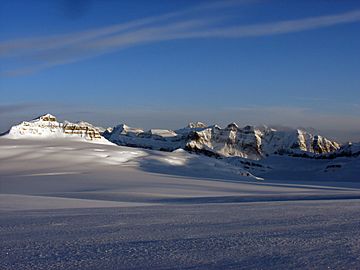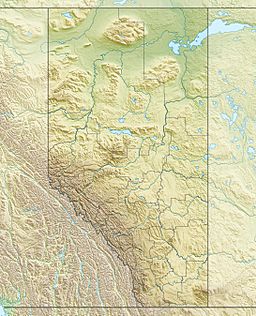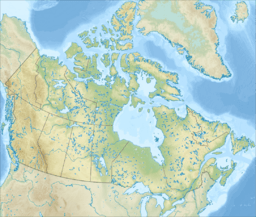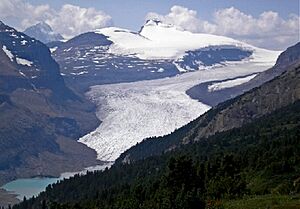Castleguard Mountain facts for kids
Quick facts for kids Castleguard Mountain |
|
|---|---|
| Mount Castleguard | |

Mount Castleguard (on the left)
|
|
| Highest point | |
| Elevation | 3,083 m (10,115 ft) |
| Prominence | 443 m (1,453 ft) |
| Parent peak | Mount Andromeda (3450 m) |
| Listing | Mountains of Alberta |
| Geography | |
| Parent range | Canadian Rockies |
| Topo map | NTS 83C/03 |
| Climbing | |
| First ascent | 1919 by the Interprovincial Boundary Commission |
Castleguard Mountain, also known as Mount Castleguard, is a tall mountain in Alberta, Canada. It stands near the southern edge of the huge Columbia Icefield. This icefield is a large area of ice and snow. The mountain is also at the northern edge of Banff National Park.
In 1918, a land surveyor named Arthur Oliver Wheeler gave the mountain its name. He thought it looked like a castle standing guard. It seemed to watch over the southern part of the Columbia Icefield. The first time people climbed Castleguard was in 1919. This climb was done by the Interprovincial Boundary Commission. This group was figuring out the exact border between British Columbia and Alberta. This border follows the continental divide, which is like a natural line where rivers flow in different directions.
Contents
What Makes Castleguard Mountain Special?
Castleguard Mountain offers amazing views. It sits on the southern edge of the Columbia Icefield. There are no other tall peaks very close by to block the view. This means you can see for many miles in every direction. You can spot many of the big mountains in the Canadian Rockies. You can also see mountains from the Selkirk and Gold Ranges. These ranges are far away, across the deep valley of the Columbia River.
How Was Castleguard Mountain Formed?
The Rocks of Castleguard
Castleguard Mountain is made of a type of rock called sedimentary rock. This rock formed a very long time ago. It was laid down in layers from the Precambrian to the Jurassic periods. Imagine tiny bits of sand, mud, and shells settling at the bottom of ancient, shallow seas. Over millions of years, these layers pressed together and turned into solid rock.
Mountain Building Forces
Later, powerful forces deep inside the Earth pushed these rock layers. This happened during an event called the Laramide orogeny. This event caused the rocks to fold and break. They were pushed up and over younger rocks. This process slowly created the tall mountains we see today, including Castleguard.
What is the Climate Like at Castleguard?
Understanding the Weather
The climate around Castleguard Mountain is known as a subarctic climate. This is based on the Köppen climate classification system. This system helps scientists describe different climates around the world.
Cold Winters and Mild Summers
In a subarctic climate, winters are very cold and snowy. Summers are usually mild, meaning not too hot and not too cold. Temperatures at Castleguard can drop below −20 °C (which is −4 °F). When the wind blows, it can feel even colder, sometimes below −30 °C (which is −22 °F). This is called the wind chill factor.
 | Selma Burke |
 | Pauline Powell Burns |
 | Frederick J. Brown |
 | Robert Blackburn |




